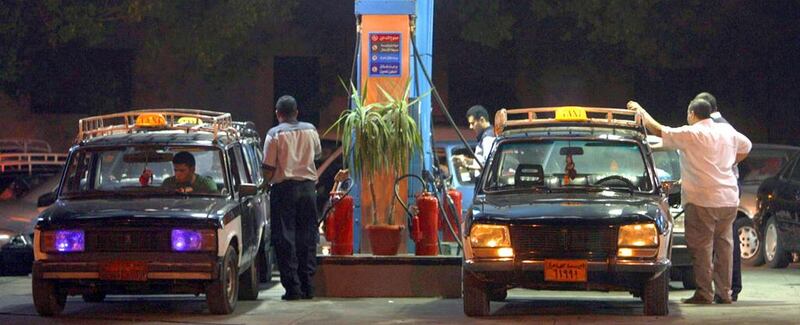Mohamed Sayed has dreamed of running his own minibus fleet for more than a decade.
But that looks further away than ever after Egypt slashed fuel subsidies overnight – sending his petrol costs soaring.
The 43-year-old from Cairo managed to keep his small tourist business together through the aftermath of the 2011 revolution as visitor numbers dwindled.
He was able to switch tack - focusing on domestic travel instead of relying on overseas tourists. Now he needs to adapt again.
“It is getting tougher by the day,” he says. “What they are doing? I don’t understand,”
Egyptian businesses and customers yesterday struggled to digest the reality of a 78 per cent increase in fuel prices, announced by the government on Friday.
The decision to slash fuel subsidies represents a first key test for the president Abdel Fattah El Sisi in his plan to revive the economy.
Despite having been anticipated for several weeks, the increase in fuel prices still came as a body blow for consumers and small-business owners in the country.
Mr Sayed, who takes pride in driving tours from Cairo to the Red-Sea coastal town of Nuweiba, said that he will have to raise his prices to compensate for the loss of profit.
“Who will have to pay for this increase? It’s the customer unfortunately.”
The increase in prices comes as the Egyptian cabinet has finally decided to grasp the nettle of the country’s subsidies on fuel, which consume almost a quarter of Egypt’s budget. The move follows the lifting of subsidies on electricity by Mr El Sisi.
While that may help Egypt’s long term development, the country’s GDP will be hit in the short term, said Mohamed Abu Basha, an economist with EFG-Hermes in Cairo.
Egypt spends almost a third of its budget on fuel and food subsidies for its population of 86 million.
“This is a wide-ranging price increase that will touch almost every fuel product in the country and will have a knock-on effect on the price of the majority of consumer products,” said Mr Abu Basha. “Plus it’s coming at a time when the economy’s not growing much, there’s very little growth in incomes, so consumers will be bearing the pain in the short term.”
Private consumption has been the main engine of economic growth for the past four years, said Mr Abu Basha.
“It’s going to be up to the government in the short and medium terms to compensate for the decrease in consumption via an increase in investment, be it from the local private sector, foreign direct investment, GCC states or elsewhere.”
The country’s middle class will be hurt by the fuel cuts due to the lack of public transport infrastructure, said Loay Hossny, 29, a bank employee in Cairo.
“Taxis will likely ditch their meter system and commodity prices will escalate,” he said. “The government said that it will take this step for a while, but the surprise is to do it in Ramadan.
Mr Abu Basha said that the Egyptian government has proposed measures to ease the pain of rising prices, including more than doubling cash subsidies for low-income families.
“The issue is, though, that these measures are not completely up and running,” he said. “There needs to be progress with them really quickly.”
In the meantime, small businesses such as Mr Sayed’s minibus company will need to start rapidly adapting to the new economic realities of Egypt.
selgazzar@thenational.ae
jeverington@thenational.ae
Follow us on Twitter @Ind_Insights





